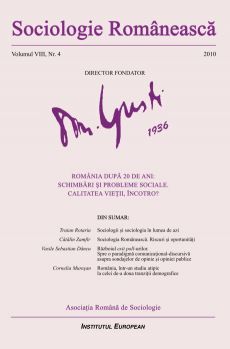Aspecte particulare ale îmbătrânirii populaţiei din România post-comunistă – consecinţe socio-economice
Peculiar Aspects of Population Ageing in Post-Communist Romania - Socio-Economic Consequences
Author(s): Emilia Herman, Maria-Ana GeorgescuSubject(s): Social Sciences
Published by: Editura Eikon
Keywords: accelerated ageing; employment decrease; economic dependency
Summary/Abstract: This paper has an interdisciplinary character and highlights certain aspects of the demographic and economic evolution in the post-communist Romania, with their peculiarities. Population ageing, foreseen by specialists, is highlighted here also on country regions, and at national level, it is debated in relation with development economic indicators. In a comparative approach at European level, we show that the share of old people, as well as the dependency rate of old people, have, for the moment, lower values in Romania, realities that do not allow a break, a lack of initiative for specific policies. The reason, which we underline, is that in our country, in comparison with the western countries which became rich before ageing, the rhythm of demographic ageing has outrun the rhythm of economic development. Moreover, the data available for the last 18 years have allowed us to show the economic and social consequences of this ageing on several major directions such as: economic dependency, impact on the employment of work resources, impact on the economic growth and on the public expenditure. The worrying evolutions in these social-economic segments are the result of the calculated indicators and their correlations, and these are: the economic dependency rates; the employment rate of the work resources; the correlations between the GDP/capita evolution and the share of the ageing population out of the total of population, between GDP/capita and the economic dependency rate of the ageing people, between the share of the savings in GDP and the share of the ageing people out of the total of population; the cost of the demographic ageing. In conclusion, acknowledging these realities, only to the extent to which the country will involve the ageing population in the process of goods and services creation, the economic development is possible. Without such a strategy, the macroeconomics disequilibrium will deepen and the demographic ageing will be a permanent obstacle to the growth of the standard of living.
Journal: Sociologie Românească
- Issue Year: 8/2010
- Issue No: 04
- Page Range: 91-103
- Page Count: 1
- Language: Romanian

